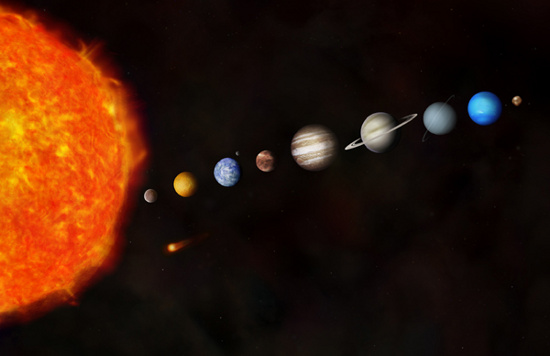Are there more 'livable' planets than Earth?
Although no evidence of extraterrestrial life has yet been given, the Ohio University team believes that they are about to find a planet that is more suited to the earth to survive life in 'twin solar systems'.
Geologists and Astronomers at Ohio State University work together to experiment with new ways to hunt extraterrestrial life. Accordingly, they searched for radioactive elements thorium and uranium, which could cause the planet's core to warm up, playing a special role in the process of tectonic plate formation, like the earth billions of years ago.
Operating within the core of certain planets can create geological cracking processes, along with earthquakes that can move large tectonic plates, causing them to slip on each other and create continental plates. These tectonic plates help maintain surface water, enabling the planet to qualify for survival.

Our solar system.
In particular, the planets selected for research are in the solar system considered to be twins with the solar system. Accordingly, the planets that move around the star like our sun are the subjects selected to use the new method of seeking life.
So far, eight solar systems similar to the solar system have been studied by Ohio experts, including seven more Thorium stars than our sun. It also shows that the orbiting planets may contain more Thorium than the earth. It makes the planet's core hotter than the earth.
In fact, the globe is in the so-called "Goldilocks zone" , which is not too hot but not too cold to survive. However, for stars that are bigger and hotter than our sun, the size of the "Goldilocks zone" may change. For that reason, distant planets still have a chance to survive.
Professor Cayman Unterborn, who presented the report at the American Geological Society Conference in San Francisco, said: 'If the planets are studied warmer than we thought, it is possible that the size of the living area will also increase. proportional to that. Most likely, hospitality is a favorable condition for bacterial proliferation and development, the simplest form of life in the universe. '
- Discover more than 700 planets outside the solar system
- Discovered 'Earth materials' in 18 other planetary systems
- Discovering 'Earth Stone' has 3 suns at the same time
- Discovering earth-like planets are the hottest planets
- Why are planets spherical, and meteorites?
- Detecting the outer three planets about the size of the Earth
- Rural or urban: Where is the freshest and most livable place?
- The Milky Way has billions of planets close to Earth
- The most exotic new planets 2012
- The super-Earth planet may contain life
- Small planets, comets near Earth in 2013
- NASA has discovered 3 planets smaller than Earth
 Van Allen's belt and evidence that the Apollo 11 mission to the Moon was myth
Van Allen's belt and evidence that the Apollo 11 mission to the Moon was myth The levels of civilization in the universe (Kardashev scale)
The levels of civilization in the universe (Kardashev scale) Today Mars, the sun and the Earth are aligned
Today Mars, the sun and the Earth are aligned The Amazon owner announced a secret plan to build a space base for thousands of people
The Amazon owner announced a secret plan to build a space base for thousands of people